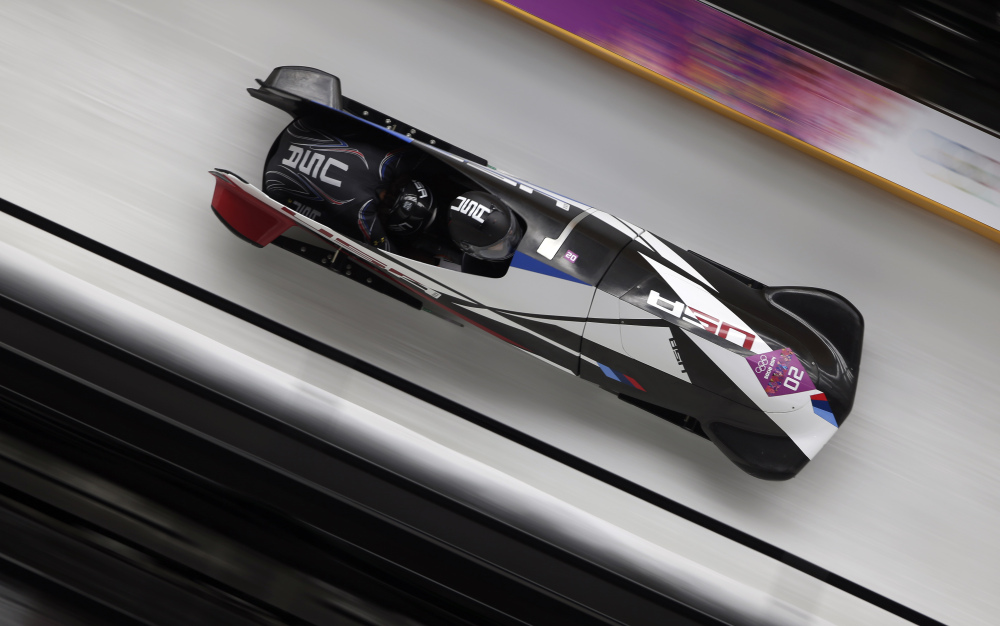KRASNAYA POLYANA, Russia — An American track star is two runs from Olympic history.
No, not her.
Lauryn Williams, who had never pushed a bobsled or even sat inside one until just six months ago, and teammate Elana Meyers lead in USA-1 at the halfway point of women’s Olympic bobsled.
They completed two drives down the Sanki Sliding Center track in 1 minute, 54.89 seconds on Tuesday to lead Canada’s Kaillie Humphries and Heather Moyse. The Canadians, trying to win their second straight Olympic title, trail by 0.23 seconds heading into Wednesday’s final two runs.
USA-3’s Jamie Greubel and Aja Evans are in third, 0.56 back.
Williams, a two-time sprint medalist in the Summer Olympics, is attempting to become just the second athlete to win gold medals in both the Winter and Summer Games.
Lolo Jones, on the other hand, wants just one.
The former hurdler is 11th with teammate Jazmine Fenlator in USA-3, 1.84 seconds behind Meyers and Williams. It’s not the result Jones had hoped for after switching to bobsled to pursue her dream of winning a medal after ballyhooed failures on the track in Beijing and London.
She’s on an icy track at these games, and to this point, it’s been as slippery as the dry ones she once ran in the summer.
“Everything went as expected,” Jones said. “We knew we would have to fight. We knew it would be four tough runs.”
So far, this Olympic competition has been no different than most during this past World Cup season, with Meyers and Humphries duking it out for first.
Humphries edged Myers for the overall championship by one point. But the stakes are much higher in Sochi, and although the two are close friends after training and even roomed together last summer, Meyers and Humphries are going hard for gold.
Humphries celebrated her triumph in 2010 on her home track in Whistler by adding a tattoo of her gold medal to the many on her chiseled body. She’s considered her artistic options if she wins again, but Humphries has to catch Meyers first.
Humphries and Moyse were first on the track Tuesday and made a clean trip, staying in the middle and keeping away from any bumps that might slow them down. They finished in 57.39 seconds, but the pair barely had time to acknowledge they had set a track record when Meyers and Williams lowered it.
USA-1’s first heat wasn’t pretty, but it was fast: a 57.26-second descent that moved them ahead of the Canadians. The Americans stretched their lead by one-tenth of a second on their second run.
Greubel, of Newtown, Pa., and Evans, of Chicago, can’t be overlooked. The pair had two speedy trips down the track, which is covered and wasn’t affected by daylong downpours in this new ski resort area northeast of Sochi.
Williams, of Rochester, Pa., won a silver medal in the 100 meters in 2006, and she received gold as a member of the 4×100 meter relay team in London. She’s attempting to join Eddie Eagan, who won gold in boxing in 1920 in Antwerp and in four-man bobsled in Lake Placid in 1932, as the only winner of gold in both Winter and Summer Games.
Meyers, of Douglasville, Ga., and Williams got off to a shaky start in their first days on the mountain. Meyers crashed her BMW-built sled on their initial training run, and Williams was late applying the brakes the following day and the pair smashed into a wall near the finish, damaging the front end of the carbon-fibered sliding machine.
Mechanics worked hard to get USA-1 up and running, and the sled seemed to handle perfectly on Tuesday, surviving her pinball-like first run.
The U.S. team arrived in Russia early to get acclimated to their surroundings and “The Wolfpack,” as they call themselves, brought some drama with them.
Jones’ selection over Katie Eberling and Emily Azevedo was criticized by some who believed coaches were influenced by the track star’s celebrity. Regardless, Jones got the nod, but was then was paired with Fenlator in USA-3, the weakest of the sleek American sleds.
For Jones, these games are another shot at Olympic glory. The Des Moines, Iowa, native had to bulk up for bobsled, eating up to 9,000 calories per day to add 20 pounds of muscle so she could help power the 400-plus-pound sled from the starting gate without losing any of her world-class speed.
Williams’ promotion into USA-1 wasn’t without controversy and risk. She and Meyers only raced once together in a World Cup event, placing second in Lake Placid, N.Y. Williams’ inexperience could be a problem, but Meyers said her blazing speed makes up for time not spent on the track.
“It’s not really taking a chance when you have one of the fastest women in the world behind you,” Meyers said after a practice run.
And right now, Williams has USA-1 out front.
Send questions/comments to the editors.


